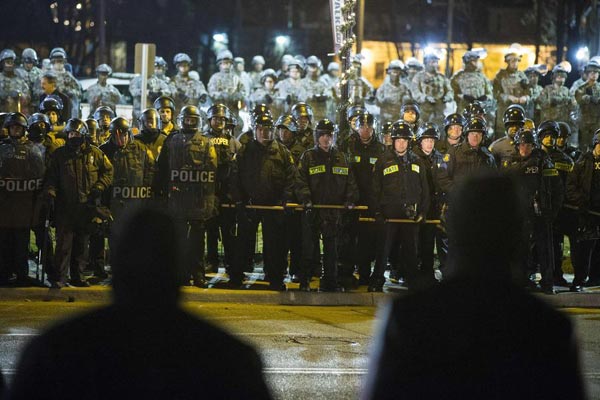Ferguson chief resigns in wake of scathing federal report
Updated: 2015-03-12 09:39
(Agencies)
|
|||||||||||
 |
|
Protesters stare at a line of police officers and National Guard soldiers during a protest to demand justice for the killing of 18-year-old Michael Brown, outside the Ferguson Police Department in Ferguson, Missouri in this file photo taken November 28, 2014. The US Justice Department has concluded that the Ferguson, Missouri, police department routinely engages in racially biased practices, a law enforcement official familiar with the department's findings said on March 3, 2015. [Photo/Agencies] |
Arrests and tear gas
The Ferguson police's initial response to arrest and use tear gas against demonstrators protesting Brown's killing was widely criticized as heavy-handed. Jackson was also accused of being tone deaf to the city's racial tensions and came under fire for his delay in releasing Wilson's name and waiting weeks to make an apology to Brown's family.
In the wake of the Ferguson protests, many police chiefs across the country have shifted policy to communicate more quickly after police use deadly force and to release the names of the officers involved.
The Justice Department report found evidence that the mostly white police force in the two-thirds majority black community was more focused on revenue-raising than public safety. The Justice Department also said officers had a pattern of using excessive force and making illegal arrests, as well as deploying attack dogs and using Tasers on unarmed people.
Jackson has commanded the police department since 2010. The department has a total of 54 sworn officers divided among several divisions.
The city said it would conduct a national search for a replacement for Jackson, whose departure is effective March 19 and who leaves with a year of severance pay, of roughly $100,000, and health insurance.
Some local activists said the police department should be shut down completely.
"This is a big step to continue to move forward but ... isn't enough," said Rasheen Aldridge, a member of a commission formed by Missouri Governor Jay Nixon to recommend community reforms. "The systemic problems that have been going on in Ferguson need to be dealt with."
Related Stories
Ferguson, Missouri, city manager resigns 2015-03-11 09:28
Ferguson report resonates in nation 2015-03-10 07:56
US Justice Dept finds racial bias in Ferguson police practices 2015-03-05 10:13
Report finds racial bias in Ferguson 2015-03-05 07:40
US preparing to sue Ferguson police over charges of racial bias 2015-02-19 10:40
US Justice Department said ready to clear Ferguson officer 2015-01-22 10:18
Today's Top News
Italian court upholds Berlusconi's acquittal
UK companies seek new opportunities in China
CNR, CSR merger passes overseas antitrust scrutiny
Official urges Dalai Lama to forsake evil ways
China approves new nuclear power project since 2011
China February inflation quickens to 1.4%
Apple unveiled first wearable watch
French Olympians among dead in Argentina crash
Hot Topics
Lunar probe , China growth forecasts, Emission rules get tougher, China seen through 'colored lens', International board,
Editor's Picks

|

|

|

|

|

|





